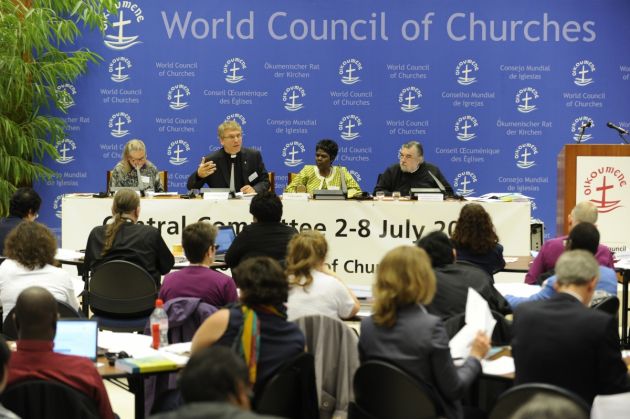Tackling Israel-Palestine turmoil needs combined churches' efforts, says WCC leader

The World Council of Churches has always considered that the Israel and Palestine situation is too strong for a divided Church to offset, the general secretary of the World Council of Churches has said.
"There needs to be combined efforts and initiatives to be sure all the churches can walk together on the pilgrimage journey of justice and peace for both Israelis and Palestinians," WCC executive head Rev. Olav Fykse Tveit said Wednesday.
The general secretary was speaking about the justice and peace work of the WCC that represents some 560 million Christian worldwide from mainly Anglican, Orthodox and Protestant traditions.
Delivering his report to the WCC's main governing body, its central committee, he said, "Through the last two years the WCC has developed and strengthened its relations and contacts with many Jewish organizations and partners working for peace and justice in Israel and Palestine."
Tveit said that since its establishment in June 2007, the Palestine Israel Ecumenical Forum's network has highlighted the WCC's general policy on Israel and Palestinian territories.
This condemns Israeli occupation of Palestinian territories and the creation of settlements in occupied territories in clear violation of international law.
Many of the forum's 70 partners have challenged consumer practices and reviewed their investment policies to ensure that the activities of the companies they hold shares with are not linked to illegal activities in the occupation or to settlements.
Tveit cited the decision by the Presbyterian Church (USA) during its assembly in June as a concrete example.
The Presbyterian Church (USA) voted by a narrow margin on June 20 to divest church funds from three U.S. companies it said were profiting from the oppression of Palestinians within Israel's occupied territories.
The vote was carried 310-303 at the 1.8 million church's General Assembly in Detroit signalling a victory for divestment supporters in the PCUSA.
The church is the biggest U.S. use divestment as a strategy to pressure Israel to return its illegally held lands.
In his report Tveit said each year, through the World Week for Peace in Palestine and Israel activity, nearly 100 events take place in more than 20 countries, involving churches, congregations, civil society actors, etc. in prayer, advocacy and education.
JERUSALEM INTER-CHURCH CENTER
He noted that the Jerusalem Inter-church Center, a joint venture between the Heads of Churches in the Holy Land, the Middle East Council of Churches and the WCC, is a vital ecumenical instrument.
It " brings the voice and the concerns of Palestinian Christians to the wide ecumenical family and to the world," said Tveit.
The Ecumenical Accompaniment Programme in Palestine and Israel knows as EAPPI is a key program in the WCC that Tveit said embodies "concrete signs of solidarity with all those, in Israel/Palestine working towards ending the Israeli occupation and for justice and peace."
The WCC has also initiated and organized theological conferences, convened discussions and ecumenical conversations on specific topics.
"These were related to burning issues in the region, especially ones related to the Christian presence and witness in the midst of the Arab revolutions," said Tveit.
The Democratic Republic of Congo, South Sudan, Nigeria, Syria and Israel and Palestine were cited by Tveit as important countries in the churches' work for justice and peace.